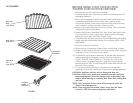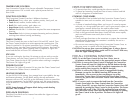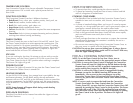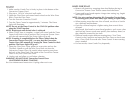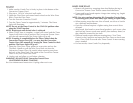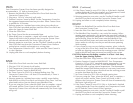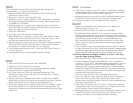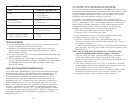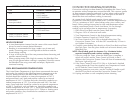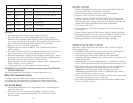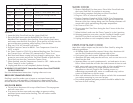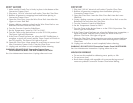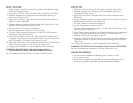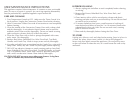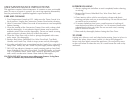CONVECTION BAKING/ROASTING
Convection cooking circulates heated air throughout the Oven Cavity
to maintain uniform temperature around the food. This constant, gentle
air flow promotes browning and seals in juices when cooking meats
and may shorten cooking time. Check your food prior to the time it
should be done and continue cooking as necessary.
As a general rule, baked goods require a lower temperature in a
Convection Oven than a convectional oven. Lower the temperature by
50°F to a minimum of 300°F when baking cakes, pies, cookies, and
bread. Follow package instructions for time and temperature when
cooking convenience foods. Check food about 3/4 way through
cooking cycle and adjust time or temperature if necessary.
1. Place Wire Pizza Rack onto the Lower Shelf Rail.
2. Plug into 120V AC electrical wall outlet.
3. Turn Temperature Control to the desired temperature setting.
4. Position Function Control to CONVECTION.
5. Set Timer Control to STAY ON or desired baking time. The
Convection Toaster Oven will shut OFF automatically if Timer is
set. Preheat if necessary.
6. Carefully center baking dish directly on Wire Pizza Rack and close
the Glass Door. You may place foods such as biscuits directly onto
Bake/Broil Pan.
NOTE: Check baked goods for doneness 5 to 10 minutes before
expected completion and continue cooking as necessary.
7. If you are using the Timer, when the BAKE time is complete, a
signal will sound, and the Timer Control will finish in the 0
position; the Convection Toaster Oven will shut off automatically;
the Power Light will go off.
8. If the Timer Control is set to STAY ON, or if the food is finished
cooking before the Timer has signaled, turn Temperature Control
to OFF and the Timer Control to the 0 position.
9. Wearing protective oven mitts, use the Tray/Rack Handle to pull
the Wire Pizza Rack out from the Convection Toaster Oven.
10. Unplug and allow to cool completely before cleaning.
14
HINTS FOR ROAST
• A meat thermometer inserted into the center of the meat should
always be used to ensure desired doneness.
• Roasting is recommended for large, tender cuts of meat and
poultry. Seasoning prior to cooking adds to the flavor and the
aroma during cooking.
• A layer of fat on the top of the roast promotes better browning and
provides natural basting.
• When roasting meats with a high fat content, the Bake/Broil Pan
may fill with grease before cooking is completed. Carefully remove
the Bake/Broil Pan using oven mitts and empty. Replace for
continued roasting.
USDA RECOMMENDED TEMPERATURES
The United States Department of Agriculture recommends that meat
and poultry be cooked to the following internal temperatures to be
sure any harmful bacteria has been killed. Ground turkey and
chicken should be cooked to an internal temperature of 165° F
and ground beef, veal, lamb and pork be cooked to an internal
temperature of 160° F. Chicken and turkey should be cooked to an
internal temperature of 170° F for white meat and 180° F for dark
meat. Goose and duck should be cooked to an internal temperature
of 180° F. Fresh beef, veal and lamb, etc. should be cooked to an
internal temperature of at least 145° F. Fresh pork should be cooked
to an internal temperature of at least 160° F. When re- heating meat
and poultry products, they should also be cooked to an internal
temperature of 165° F.
13
INTERNAL TEMPERATURE ROASTING CHART
CUT INTERNAL TEMPERATURE
Beef 145°F Rare
160°F Medium
170°F Well Done
Ham (fresh) 160°F
Ham (precooked) 140°F Rare
Lamb 160°F Medium Well
Pork 160°F Medium
170°F Well Done
Turkey or Chicken, Whole 180°F
Turkey or Chicken, Breast 170°F



